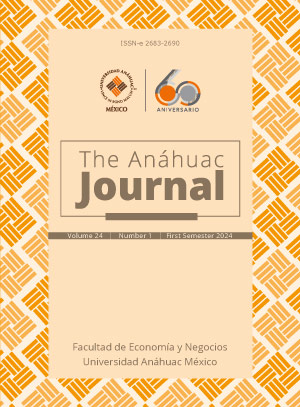Análisis del impacto de las controversias por factores ASG en la valuación de acciones en el mercado mexicano
Contenido principal del artículo
Resumen
Existe una amplia literatura sobre las motivaciones que llevan a diversos inversionistas a integrar factores ambientales, sociales y de gobierno corporativo (ASG) en sus estrategias; sin embargo, los estudios sobre esta temática se centran en los mercados desarrollados y no detallan con evidencia si estos factores, a través de las potenciales controversias que generan en su ausencia, tienen efectos significativos en la valoración de instrumentos financieros, por ej., acciones o bonos emitidos por empresas. Por esta razón, el presente estudio analiza y demuestra con evidencia estadística que las controversias asociadas a factores ASG y relacionadas con las acciones en el mercado mexicano aún no se encuentran integradas en las valuaciones correspondientes.
Downloads
Detalles del artículo
Sección

Esta obra está bajo una licencia internacional Creative Commons Atribución-NoComercial-CompartirIgual 4.0.
The Anáhuac Journal se distribuye bajo Licencia Creative Commons Atribución-NoComercial-CompartirIgual 4.0 Internacional.
Cómo citar
Referencias
Albuquerque, R., Koskinen, Y., Yang, S., & Zhang, C. (2020). Resiliency of environmental and social stocks: An analysis of the exogenous COVID-19 market crash. Review of Corporate Finance Studies, 9(3), 593–621. https://doi.org/10.1093/rcfs/cfaa011 DOI: https://doi.org/10.1093/rcfs/cfaa011
Baker, M., Bergstresser, D., Serafeim, G., & Wurgler, J. (2022). The pricing and ownership of US green bonds. Annual Review of Finance Economics, 14, 415–437. https://doi.org/10.1146/annurev-financial-111620-014802 DOI: https://doi.org/10.1146/annurev-financial-111620-014802
Barber, B., Morse, A., & Yasuda, A. (2021). Impact investing. Journal of Finance Economics, 139(1), 162–185. https://doi.org/10.1016/j.jfineco.2020.07.008 DOI: https://doi.org/10.1016/j.jfineco.2020.07.008
Bauer, R., Ruof, T., & Smeets, P. (2021). Get real! Singles prefer more sustainable investments. Review of Financial Studies, 34(8), 3976–4043. https://doi.org/10.1093/rfs/hhab037 DOI: https://doi.org/10.1093/rfs/hhab037
Bloomberg L.P. (n.d.). [Mexican public equity daily prices, and ESG controversies 2013Q1–2024Q1 in MXN] [Data set]. Retrieved February 15, 2024, from SFU Bloomberg terminal.
Ceccarelli, M., Ramelli, S., & Wagner, A. (2023) [Forthcoming]. Low-carbon mutual funds. Review of Finance. [Finance Working Paper N° 659/2020]. https://dx.doi.org/10.2139/ssrn.3353239 DOI: https://doi.org/10.2139/ssrn.3353239
Cornell, B., & Damodaran, A. (2020). Valuing ESG: Doing Good or Sounding Good? NY Stern School of Business. [SSRN Working Paper #3557432]. https://dx.doi.org/10.2139/ssrn.3557432 DOI: https://doi.org/10.2139/ssrn.3557432
Department of Statistics and Data Science. (n.d.). Comparison of two means. Yale University. http://www.stat.yale.edu/Courses/1997-98/101/meancomp.htm
Fama, E., & French, K. (2007). Disagreement, tastes, and assets prices. Journal of Finance Economics, 83(3), 667–689. https://doi.org/10.1016/j.jfineco.2006.01.003 DOI: https://doi.org/10.1016/j.jfineco.2006.01.003
Hartzmark, S., & Sussmann, A. (2019). Do investors value sustainability? A natural experiment examining ranking and fund flows. Journal of Finance, 74(6), 2789–2837. https://doi.org/10.1111/jofi.12841 DOI: https://doi.org/10.1111/jofi.12841
Heeb, F., Kölbel, J., Paetzold, F., & Zeisberger, S. (2023). Do investors care about impact? Review of Finance Studies, 36(5), 1737–1787. https://doi.org/10.1093/rfs/hhac066 DOI: https://doi.org/10.1093/rfs/hhac066
Heinkel, R., Kraus, A., & Zechner, J. (2001). The effect of green investment on corporate behavior. Journal of Financial and Quantitative Analysis, 36(4), 431–449. https://doi.org/10.2307/2676219 DOI: https://doi.org/10.2307/2676219
International Monetary Fund (IMF). (2024). World Economic Outlook Update, January 2024: Moderating inflation and steady growth open path to soft landing. https://www.imf.org/en/Publications/WEO/Issues/2024/01/30/world-economicoutlook-update-january-2024
Krueger, P., Sautner, Z., & Starks, L. (2020). The importance of climate risks for institutional investors. Review of Finance Studies, 33(3), 1067–1111. https://doi.org/10.1093/rfs/hhz137 DOI: https://doi.org/10.1093/rfs/hhz137
Morningstar Inc. (n.d.). [Mexican public equity funds, ESG controversies through workspace 2013Q1–2024Q1 in MXN] [Data set]. Retrieved February 15, 2018, from Morningstar Direct.
World Economic Forum (WEF). (2024). The Global Risks Report 2024. Insight report (19th ed.). https://www3.weforum.org/docs/WEF_The_Global_Risks_Report_2024.pdf

